Executive Committee Nominees
The 2024 elections for new Executive Committee members have now closed. If you are interested in nominating yourself or a colleague for the a2ru Executive Committee in a future election cycle, please contact a2ru Executive Director Maryrose Flanigan at flanigam@umich.edu.
This committee takes a key role in advising a2ru staff in how we serve our mission and lead inter-institutional collaborations and thought leadership on behalf of the entire network. We partner with these individuals to enact new programs; we rely on these committee members to weigh in on how we spend a2ru’s resources, from staff convening time as how we allocate a2ru revenue and gift funds. They also coordinate leveraging external funds to resource both member schools and a2ru network activities aligned with a2ru’smission. The committee also works in monthly meetings to strategically chart the direction of the network’s activities.
The 2024 nominees included:
Soul Brown, Director of Research, Rhode Island School of Design (RISD) (Running for 2nd Term)
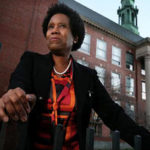 Nominee Biography
Nominee Biography
Soul Brown is a research administrator, doctoral candidate, youth worker, writer, creative practitioner, and social justice educator. Presently, she directs the RISD Research office at Rhode Island School of Design, where she promotes faculty and graduate students’ generation of new knowledges and ways of making through the conduct of sponsored, interdisciplinary, transformative research. Soul also is a PhD candidate in an interprofessional educational leadership and healthcare administration program at Pacific University (Oregon). Her research focuses on historical and contemporary experiences of Black student success in the United States through the frameworks of Critical Race Theory and Community Cultural Wealth. She employs qualitative methodologies of Voice Scholarship and Phenomenology to explicate counternarratives of BIPOC schooled experiences. She co-teaches a course on the Pathology of Race and Racism in Healthcare.
Prior to joining RISD (Riz-dee) in July 2020, Soul directed Grants Development for Massachusetts Bay Community College. She successfully tripled MassBay’s grants income, helping to transform the college’s ability to meet the needs of constituents through implementing new academic programs, providing faculty and students with research opportunities, and spurring investments in facilities and equipment.
Soul has over three decades of experience leading innovative nonprofits and creative projects that focus on BIPOC community and youth development, cultural arts, and social justice. She earned her BA in English from Tufts University and Master in Public Administration from Framingham State University.
Nominee Statement
I am optimistic about my second term in the a2ru Executive Committee and to be representing an art and design school amongst the institutions of higher education. There are some who might question the connection between art and design institutions and comprehensive research universities, but art institutions are also sites for advanced innovation, knowledge generation and the development of astute thinkers and practitioners who aim for profound global impact.
At Rhode Island School of Design (RISD), we unabashedly combine creativity and scholarship. Within our academic programs, laboratories, and partnerships we promote transdisciplinary, sustainable, and equitable approaches in theory and practice, of which there is growing recognition of their essentialness for this century and beyond. Collaborating with peer and research institutions, industry, government, communities, and others, our faculty and students are sought after for generating “out of the box” solutions to issues such as the need for durable and flexible materials and food cultivation in space; regeneration of oceans and soils to mitigate ecological damage; creation of affordable and livable neighborhoods through engaging residents in design thinking processes related to developing net zero homes, alternative transportation systems, or addressing public health issues such as opioid addiction. As RISD’s Research Director, I work to stimulate investment in novel concepts and transformative research activity.
Essential to my own worldview is my background in youth development, Black diasporic culture, social justice organizing, and arts and media. The principal focus of my career has been in foregrounding BIPOC and immigrant communities to both recognize and further the development of their indigenous methods of creativity and innovation, e.g., oral traditions (including hip hop) and community cultural wealth. I am interested in promoting the investigation of often disregarded community-based methodologies, which I do by day as a research director and at other times as a doctoral candidate and engaged community member. These are expertises that I can bring to the conversation at a2ru.
Jason Freeman, Interim Associate Vice Provost for the Arts, Georgia Tech
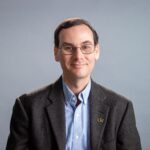 Nominee Biography
Nominee Biography
Jason Freeman is a Professor of Music at Georgia Tech, where he has taught since 2005. He has previously served as chair of the Georgia Tech Arts Council (2016 – 2019) and chair of the Georgia Tech School of Music (2018 – 2024). He currently serves as Interim Associate Vice Provost for the Arts, where he oversees the Institute’s strategic plan for the arts. This plan includes the development of new academic programs in arts+tech and the creation of a new campus arts district.
Freeman’s artistic practice and scholarly research focus on using technology to engage diverse audiences in collaborative, experimental, and accessible musical experiences. He also develops educational interventions in K-12, higher education, and informal learning contexts that broaden and increase engagement in STEM disciplines through authentic integrations of music and computing. He co-created EarSketch, a free online learning environment that has been used by over a million students worldwide to learn coding through music composition, production, and remixing.
His music has been performed at Carnegie Hall, exhibited at ACM SIGGRAPH, published by Universal Edition, broadcast on public radio’s Performance Today, and commissioned through support from the National Endowment for the Arts. Freeman’s wide-ranging work has attracted support from sources such as the National Science Foundation, the Blank Family Foundation, Google, and Amazon. He has published his research in leading conferences and journals such as Computer Music Journal, Organised Sound, NIME, and ACM SIGCSE. Freeman received his B.A. in music from Yale University and his M.A. and D.M.A. in composition from Columbia University.
Nominee Statement
My own institution has initiated a transformational investment in arts infrastructure and programs, with a focus on arts integration in teaching and research alongside community and industry engagement. The insights and wisdom from across the A2RU network, as well as from its leadership, have already been invaluable in guiding our efforts. I am interested in being a part of the A2RU executive committee so that I can deepen connections within the network, share the outcomes of our own efforts on placemaking at the intersection of arts and technology, and serve an organization that is so critical to our field. I am particularly interested in contributing to, and learning from, ongoing initiatives on arts data collection across the network, casemaking for the value and role of the arts in the university research enterprise, and communicating the essentiality of the arts in the academy within the context of broader institutional attention to workforce development.
Megan Halpern, Founder & Director, Center for Interdisciplinary Research, Collaboration, Learning, and Engagement (CIRCLE), Michigan State University
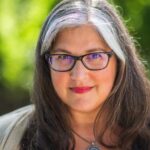 Nominee Biography
Nominee Biography
Dr. Megan K. Halpern is the founder and director of Michigan State University’s Center for Interdisciplinary Research, Collaboration, Learning, and Engagement (CIRCLE), and an associate professor of Science and Society in MSU’s residential college for science, Lyman Briggs College. She studies the intersection of art and science, interdisciplinary collaboration, and public engagement with science. Notably, she co-edited the Routledge Handbook of Art, Science & Technology Studies, which introduces art-science studies as a coherent field of research. Her work often draws on arts research and research-through-design methodologies, and she incorporates arts-based pedagogical practices into her teaching. She earned her PhD in Science Communication from Cornell University and completed a Postdoctoral Research Fellowship at Arizona State University in the Center for Nanotechnology and Society and the Center for Science and the Imagination. Before earning her PhD, Dr. Halpern received a BA in studio art from Smith College. She worked as a set designer and scenic artist in New York City and in 1999, she co-founded Redshift Productions, a company that created performances inspired by science in collaboration with scientists.
Nominee Statement
I am interested in joining the Executive Committee of a2ru so that I can continue to advocate for the arts as an important and often overlooked form of knowledge production. As an art-science researcher and a practitioner of arts-based methodologies and pedagogies, I have come to understand the precarious role the arts play in academia (and in culture) and I have had the opportunity to develop practices and strategies to elevate the role the arts play in interdisciplinary research endeavors. As the director of CIRCLE, I have been able to combine my work as a researcher with my administrative and leadership experience. In our inaugural year, CIRCLE has focused on building interdisciplinary communities, facilitating and training interdisciplinary collaborators, and developing long-term strategies for structural and institutional change. I welcome the opportunity to draw on this experience to help support a2ru, whether that might involve working with the Centers and Institutes Working Group to help support this work at other institutions or engaging in a strategic planning process that will guide us through the next decade.
Sonia Hirt, Dean and Hughes Professor in Landscape Architecture and Planning, University of Georgia (Running for 2nd Term)

Nominee Biography
Initially trained as an architect in her hometown of Sofia (the capital of Bulgaria), Sonia Hirt holds a master’s and a doctoral degree in urban and environmental planning from the University of Michigan. Prior to joining the University of Georgia, she served as Dean of the School of Architecture, Planning and Preservation at the University of Maryland in College Park; Associate Dean for Academic Affairs at the College of Architecture and Urban Studies, Virginia Tech; and Visiting Associate Professor at Harvard’s Graduate School of Design. Recently awarded a Guggenheim fellowship, she will continue working on her sixth book, tentatively entitled “America’s Hurry: Making Sense of Time and Space in My Adopted Country.” The book is under contract with MIT Press.
Sonia is the author/co-author of 85 scholarly and professional publications with 2,500 citations. Her latest article, on shrinking cities, co-authored with Professor Robert Beauregard of Columbia University, was published in International Planning Studies (2021). Sonia’s book “Iron Curtains: Gates, Suburbs and Privatization of Space,” published by Wiley-Blackwell, received the Honorable Mention for the Book Prize in Political and Social Studies sponsored by the Davis Center for Russian and Eurasian Studies at Harvard University. This award is given to an outstanding monograph in anthropology, political science, sociology, or geography. Her book “Zoned in the USA: The Origins and Implications of American Land Use Regulation,” published by Cornell Press, received several academic honors. These include the Honorable Mention for the 2015 Best Book Award of the Urban Affairs Association; shortlist for the Best Book Award of the International Planning History Society; one of the Ten Best Books in Urban Planning, Design and Development of 2015 by Planetizen; list of Outstanding Academic Titles by Choice Magazine; and the biennial John Friedmann Best Book Award by the Association of Collegiate Schools of Planning. In 2019, Planetizen named the book one of fourteen Top Urban Planning Books of the Decade (2010-2020). In 2020, Book Authority ranked it in the Top Forty Land Use Law Books of All Time.
Sonia is also the editor of “The Urban Wisdom of Jane Jacobs” (with Diane Zahm), published by Routledge, and the author of “Twenty Years of Transition: The Evolution of Urban Planning in Eastern Europe and the Former Soviet Union, 1989-2009” (UN HABITAT; with Kiril Stanilov). She is an elected Fellow of the American Institute of Certified Planners. She is currently the Editor-in-Chief of the Journal of Planning History (JOPH)—the official peer-reviewed journal of the Society for American City and Regional Planning History (previously, she was Co-Editor-in-Chief of JOPH). Through her career, she is or has been member of the editorial boards of ten scholarly journals, including Planning Perspectives, Planning Research and Practice, and Urban Design International.
Scholarly Interests
Sonia focuses on the interactions between social and cultural values and the urban built environment. Through her scholarship and teaching, she aims to advance understanding of the relationships between social processes, cultural values, and urban forms, and to create opportunities to make cities more equitable, prosperous, and sustainable. Her research has both a theoretical and an applied perspective. She strives to enhance the quality of urban environments by developing a richer theoretical understanding of the social processes and cultural values that influence their evolution. She also strives to provoke critical debates within the design and planning professions and thus contribute to innovation in practice.
Nominee Statement
I would like to contribute to a2ru because I believe no university can be world-class without work-class arts. I have had the privilege to work at Virginia Tech, the University of Maryland, and now the University of Georgia. All three institutions have wonderful and multi-faceted arts programs, but all face certain challenges—and I think there is a good reason to believe that these challenges are common to many (if not most) US universities.
- We need a more expansive and inclusive definition of the arts. On our campuses we are confining our understanding of “arts” to the traditional fine arts units and schools, not including, for example, disciplines such as landscape architecture, historic preservation, or urban planning can be understood as arts. It seems a broader definition would help us all.
- We need to focus on how to admit a greater number and a more diverse body of arts students. The domination of traditional metrics like SAT and GPA should be reconsidered. We are going to miss educating the next Frank Lloyd Wright or Zaha Hadid because their GPA was not high enough to help our universities get high rankings. If we don’t advocate for this, who will?
- Faculty in the arts (and humanities) programs in R1 universities are facing common challenges in terms of promotion, tenure, and retention. We need the arts faculty to succeed in the arts areas they claim as their own—not where others tell them to be.
- What is arts research? Isn’t art research in itself? I would like to advocate to expand the definition of “research” in a way that reflects the complexity and inherent scholarly aspects of the arts.
Craig Kier, Director, Arts for All, University of Maryland
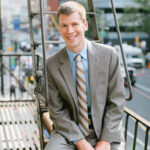 Nominee Biography
Nominee Biography
American conductor Craig Kier has conducted performances in some of the most significant opera houses throughout the United States and on international stages. He is a School of Music Professor at the University of Maryland and in 2023, joined the Arts and Humanities Dean’s leadership team as Director of the campus-wide Presidential initiative, Arts for All.
As Director of the Maryland Opera Studio (MOS), Kier expanded the footprint of the program’s activities, connecting the MOS curriculum and programming to areas across campus and beyond. In addition to his work as a conductor, his research includes the exploration of combining virtual reality with diverse musical genres to increase access to music and how such technologies can be utilized in medicine. His research has been published in the journal Pain and presented at virtual reality conferences throughout the United States.
He has also established an annual commissioning prize as part of the Maryland Opera Studio New Work Reading Series, engaging historically underrepresented composers and librettists to cultivate their creative voices, allowing emerging artists an opportunity to work directly with a creative team on a work written specifically for them, and audiences an opportunity to be exposed to new work and observe the creative process. Along with his dedication to the development of New Work, Kier was a key member of the planning committee for the UMD campus wide 2018/2019 Year of Immigration which included serving as Artistic Director for the festival celebrating the works of Kurt Weill. In collaboration with The Kurt Weill Foundation for Music, this year-long festival created programming and curriculum that included nearly every area of the UMD School of Music.
In 2023, Kier joined the Arts and Humanities Dean’s office as Director of the campus-wide Presidential initiative, Arts for All, and currently serves as Advisor for the Maryland Opera Studio. In 2020, he was named Artistic and Music Director of the Annapolis Opera, where he continues to lead performances, programming, and community engagement activities.
Nominee Statement
As Director of the Campus-wide Presidential Initiative, Arts for All, at the University of Maryland, I regularly articulate the importance of the arts within a major research university to a wide variety of audiences. And while incremental progress is being made through careful relationship building with diverse disciplines across UMD’s campus, I am eager to serve on the A2RU Executive Committee and contribute more actively to this important network. I am interested in helping the A2RU network grow, strategically exploring varied ways to fund the network, expand membership, and ensure we continue to expand the ways we articulate the importance of the arts in cross-collaborative areas. I have seen first hand the importance of contextualizing the importance of arts to all audiences, telling our story in quantitative and qualitative ways, and hope to have the opportunity to serve on the Executive Committee to ensure our work is actively contributing to the larger arts ecosystem.
Carly Lettero, Associate Director of Arts, Science, Humanities and Technology Integration, Patricia Valian Reser Center for Creative Arts (PRAx), Oregon State University
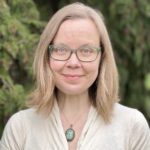 Nominee Biography
Nominee Biography
Carly Lettero is Associate Director of Arts, Science, Humanities and Technology Integration at Oregon State University’s Patricia Valian Reser Center for Creative Arts (PRAx). She also directs the Spring Creek Project, a program that, for more than 20 years, has been bringing together the practical wisdom of environmental science, the clarity of philosophy, and the transformational power of the written word and the arts to envision and inspire just and joyous relations with the planet and with one another. Carly envisions and builds programs and residencies, nurtures collaborations and supports thinkers and creatives. She thrives at intersections—places where ideas and people and disciplines come together to imagine new stories and solutions to the world’s most pressing problems.
Nominee Statement
I’d be honored to serve on the a2ru Executive Committee. I have been working at the intersection of arts, humanities, and sciences at OSU for nearly 20 years, and I am interested in how intersectional collaborations shift how people see the world and their place in the world. I am committed to the practical work of fostering these collaborations for students, faculty, and institutions. I’d like to contribute to a2ru by helping to identify and share stories about effective, meaningful and generative collaborations between artists, humanities thought leaders, scientists, and engineers.
Laura Levin, Associate Professor of Theatre and Performance, York University
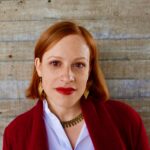 Nominee Biography
Nominee Biography
Laura Levin is Associate Professor of Theatre and Performance at York University (Toronto) and York Research Chair in Art, Technology, and Global Activism. Her research focuses on site-specific, immersive, and intermedial performance; art, human rights, and environmental justice; and research-creation methodologies. Levin has published numerous articles and journal issues on site-specific, digital, and political performance; is former Editor-in-Chief of Canadian Theatre Review; and author of award-winning books Performance Studies in Canada (2018, with Marlis Schweitzer) and Performing Ground: Space, Camouflage, and the Art of Blending (2014), the latter exploring activist approaches to space in performance by women and artists from marginalized communities. She is Editor of Theatre and Performance in Toronto (2011), Conversations Across Borders (2011), a collection of dialogues on performance and border culture with Guillermo Gómez-Peña, and a book on queer feminist performance art icon Jess Dobkin (Jess Dobkin’s Wetrospective), forthcoming in Fall 2024.
Levin has significant experience leading large-scale transnational and collaborative research-creation projects. She is Principal Investigator (PI) and Director of Hemispheric Encounters Network, a SSHRC Partnership Grant exploring performance’s potential for addressing shared human rights and environmental justice issues across the Americas and enacting social change (hemisphericencounters.ca). She is also Director of Sensorium: Centre for Digital Arts & Technology, an organized research unit at York, which promotes scholarly inquiry and creative experimentation in performance and digital culture. In this role she supports arts researchers in dreaming up and developing community-engaged, digital research-creation methodologies. Relatedly, Levin serves as Community Partnerships Lead on the CFREF grant, Connected Minds (https://www.yorku.ca/research/connected-minds/), a Sensorium-supported initiative spanning the arts, sciences, engineering, and law. Here, she provides strategic direction on partnered research addressing social impacts of AI and other disruptive technologies.
Laura is a practicing artist and has worked as a director, dramaturg, curator, and performer on community-engaged and digitally inventive installations that meet audiences on an intimate level, engaging participants sensorially in stories of place that promote understanding of underrepresented social experiences—from staging hidden urban stories in shoebox cinemas at Toronto’s Bata Shoe Museum (ARCADE, 2016; with Shauna Janssen, Stephen Lawson, and Aaron Pollard), to creating mobile archives of performance memory that you can carry in small pouches that fit in your pocket (Talixmxn, Mexico City, 2019; with Jess Dobkin), to developing (as dramaturg) a performance exhibition and AR app that which conjure, through cast-off ephemera of the everyday, vibrant histories of local activism within queer communities (Jess Dobkin’s Wetrospective, 2021). Most recently, she partnered (as dramaturg and co-creator) with digital theatre company SpiderWebShow to build a prototype for staging live theatre in VR—a response to the detrimental effects of COVID-19 on the arts sector and the need to make theatre safe and accessible for geographically dispersed audiences. Using as a springboard an immersive play on Toronto’s 2010 G20 summit protests, You Should Have Stayed Home (directed by Michael Wheeler) has toured to many XR arts festivals and international events.
Nominee Statement
I am honoured to be considered for the a2ru Executive Committee and would bring to this position my background as an artist-scholar leading large-scale research-creation projects bridging multiple disciplines and geographic contexts. This experience includes: serving as Director for Sensorium, a transmedia arts research centre (current role) and previously as Associate Dean, Research for York’s School of the Arts, Media, Performance & Design; editing a theatre journal promoting artist-academic dialogue; and directing a $2.5 million Partnership Grant from SSHRC (Social Sciences and Humanities Research Council of Canada), which uses performance methods to build coalitions among 32 human rights and environmental justice partners across the Americas. More recently, Levin also took on the role of as Community Partnerships Lead on Connected Minds, a $105 million Canada First Research Excellence Fund Grant exploring the ethical implications of growing human entanglements with intelligent technologies. As an Executive Committee member, I would be delighted to connect a2ru with these dynamic research centres, projects, and networks, while collaborating with the organization to develop a better understanding of the vital role artists can play in interdisciplinary research endeavours. I would bring insights into how to integrate artists thoughtfully into STEM research teams, ensuring their unique expertise and approaches to asking research questions through creative practice is centred and valued. Further, I look forward to collaborating with a2ru on research I am undertaking as York Research Chair in Art, Technology, and Global Activism, which focuses on the important role the arts can play in engaging with threats to democracy posed by the global spread of political polarization, often intensified by AI and social media platforms. How might the arts intervene at a moment when it is becoming harder to hear divergent views and engage in thoughtful debate? Because the challenge of polarization requires new tactics and methods, I would be interested in working with a2ru to pilot new models for collaborating across art, activism, and STEM, insisting that this is a crucial step in bridging political and geographic divides.
Matthew Nolan, Assistant Professor of Game Sound and Music, George Mason University
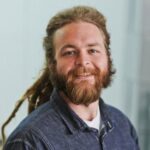 Nominee Biography
Nominee Biography
Matt Nolan is an Assistant Professor of Game Sound and Music and co-founding member of the Computer Game Design Department at George Mason University. Matt started on the administration side of higher education in 2008, and eventually found his pace and passion for teaching. He has been teaching for his department full-time since 2014. Matt Teaches linear and non-linear sound design, game design, and serious games. In addition to teaching, Matt works on faculty focus groups for new concentrations in the College and by-laws committees for the department. He holds an MFA in Visual Art/New Media from George Mason University(’22), a Master’s of Music in Music Composition from George Mason University(’12), and. Bachelor of Music in Music Synthesis as a voice principal from Berklee College of Music(’07).
With roots as a singer and musician, his work in technology, interactivity, and the arts has constantly embraced new interfaces and novel approaches to artistic expression. Matt has 28 music publications under his belt. He freelances on game and film projects and ran his own independent game design studio, Puddle Jump Games.
Presentations, performances, and talks include: The New York Electronic Arts Festival/ New Interfaces for Musical Expression, The Florida Electro-acoustic Music Festival, The Seoul International Computer Music Festival, The Hirshhorn, The East Coast Games Conference, and TedX. Matt has had nine recent exhibitions and installations of his artwork. In addition to his work in technology and the arts, Matt is a certified Permaculture designer and spends time working on projects in nature.
Nominee Statement
George Mason University is one of the newer member institutions of the Alliance for the Arts in Research Universities. Navigating and understanding the challenges and features of being a professor and working artist at a research tier one university has been a parable of my career so far. I have always had the feeling that many art colleges and professionals have been left out on their own to fend for themselves against the larger, traditional silos of research. Best practices are often something arts organizations just figure out over time with trial and error.
Why should it be that the organizational psychology, structure, and means for research at a University has language embedded that challenges “art as research”, rather than embracing it? It can lead to artists in the organization changing their creative work to fit the structure of the institution. It can also lead to individual bias, even within arts groups or groups of artists, as to what is qualified research within the arts. Interdisciplinary work can also create challenges to the traditional departments based around single-subject mastery. Our Computer Game Design Department was started by the two deans of art and engineering, but quickly became the grandchild of the arts dean, for administrative clarity, not because we don’t do computer science. However, this lead to isolation of our faculty and students from the original two places, and cut off the IDEA because of the WAY.
A2Ru is an organization that does far more than just offer advice or assistance to arts groups, it goes beyond, asking challenging questions like, “how are you incorporating the arts into your STEM course?” This approach not only changes the discourse around the arts on campus, but also augments the implicit value of “the arts” in education overall. The model for R1 institutions to follow for these areas of development and inclusivity for their arts orgs is streamlined with the resources that your organization publishes. There is still work to be done to get it right, and the work will never truly be done, due to the rapidly evolving state of technology and education as a whole. It in is this interest that I would like to serve on the board, to forward the mission while helping with updates and ideas.
I am interested in working with your organization in any capacity you all think I will best serve, but my perspective as a teaching faculty member in the arts and technology will likely be helpful in the following areas: metrics, faculty equity, by-laws, arts as research, AI, internal organizational fundraising ideas and collaboration, strategies for fundraising, and physical or virtual publications for members with calls for works and articles to attract new membership and add value for current members.
I have a keen interest in using A2RU as a catalyst for local action on campus at George Mason University. I plan to host a working group on campus as a way to include all interested parties and raise awareness of the mission of A2RU and to inform interested parties such as faculty affairs, Office of Research and other Admin as to the resources we have available. I would selfishly like to see my college and university adopt good practices and documents for guidance without delay, to reduce the confusion, push back, and panic that often occurs when it is time to promote an artist faculty member. This starts with groups like A2RU and reaches back home, and for me, that is a perfect harmony.
The future holds many possibilities regarding arts in higher education. Some possibilities seem bleak, some more promising, but with a group like A2RU offering their support, research universities are developing good practices around how they treat the Arts and the Artists that teach for them. Quantifying the data for these arts colleges is often a burdensome challenge and may lead to outright imbalances in funding due to underestimation of impact across campus. A formal approach to the analysis of artistic research is needed to clarify the true value of art publication as research.
You all have too many good ideas and need a diverse perspective to back it up. As one of the faculty that these policies directly impact, it is my hope to spark important discourse. I would love to be the voice that raises new ideas in an A2RU meeting. If you need a respectful agitator with insightful, caring, and thoughtful responses, it will be my honor if you accept my nomination onto the board.
